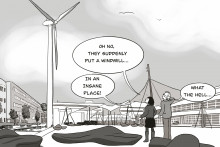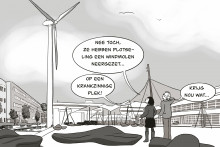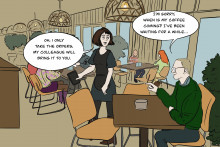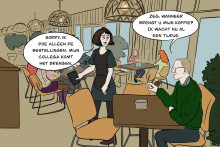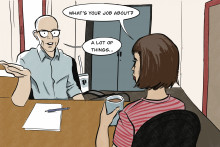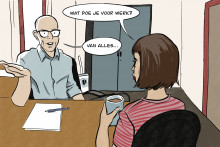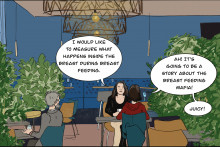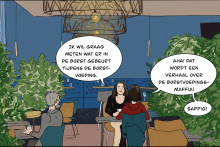The interview for this series takes place before the memo 'Omtzigt: function elsewhere?' has thrown our country into turmoil. The parliamentary debate on back-room politics, on power and counter-power, has not yet taken place. But Marcel Boogers has known for years that many administrative decisions lack democratic legitimacy. Especially when it comes to complex decision-making processes.
'A good example is the National Climate Agreement, which is being fleshed out regionally by the provinces, water boards and municipalities. Radical choices are being made that will affect life and landscape for a long time. Which neighbourhoods will be off gas and where will windmills be placed? There are major interests involved, but the residents and their representatives are not really given a say in the decision-making process. Often the municipal council only gets involved at the last minute, when saying 'no' is not really an option anymore. Unelected officials set the tone.'
Boogers investigates how such complex decision-making occurs. He does so on the basis of surveys, interviews, documents and statistical data. An important misunderstanding among administrators, he discovered over the years, is that taking the standard administrative path via democratically elected bodies is often only cumbersome and unnecessary. If only the parties around the table would pursue the same social goal, so the thought went, they could be more decisive and effective. 'In public administration we always tend to see effectiveness and democratic legitimacy separately, as two separate values. I have found out, especially when different boards work together, that they have to go hand in hand. If decision-making is not democratically organized, then it can never be effective.'

Another example: the Twente investment agenda, a long-term socio-economic plan that benefits the entire region. That was an enormously laborious process. 'Too little was invested in finding a shared vision. How do we look at Twente, what does Twente need? You could have done that by involving municipal councils and interest groups, but that was only attempted sparingly. If the general interest is not experienced as something universal, all those municipal councils will ultimately opt for their own municipal interests.' The fact that the 'Agenda voor Twente' was finally drawn up is primarily thanks to the central government, which made extra investments in regional economic developments by means of regional deals.
Poldering (endless deliberation) is not automatically the solution, warns Boogers. 'Poldering means that you allow interest groups to have their say at all sorts of tables. But interest groups no longer always have the legitimacy to represent a particular interest. The degree of organization is decreasing in the Netherlands, people are less members of political parties, trade unions or other organizations. So you can't always rely on interest groups to properly represent those interests.'
To better communicate his knowledge to a wide audience, he would like to make a documentary, or a long magazine article. 'One of the limitations of science is that you only focus on a small group of peers, while the work is relevant to a much larger group. I would like to make an in-depth reconstruction of a complex decision-making process. All kinds of parties are sitting at the table at the same time and then sometimes something small suddenly happens - an external shift, or someone in a grumpy mood - which causes the decision-making process to suddenly take a different path and have a different outcome than everyone expected.'



